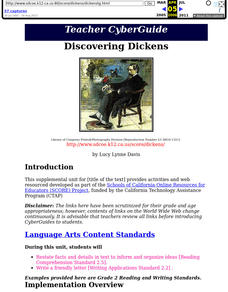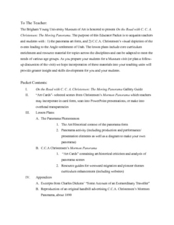Curated OER
During Reading Strategy for Charles Dickens’ Great Expectations
Readers create a literary scrapbook for one of the characters in Charles Dickens' Great Expectations and fill it with mementoes, journal entries, letters, etc. A great way to get kids to think about characterization.
Curated OER
Greed is Good?
From Mr. Merdle to Mr. Madoff? A viewing of the PBS adaptation of Charles Dickens’ “Little Dorrit” launches an examination of greedy characters in literature and a study of greed, unfairness, and economic hardship today. The richly...
National Math + Science Initative
Vocabulary Study: A Christmas Carol by Charles Dickens
Like Scrooge, your language arts learners will not shut out the lessons you teach in a vocabulary activity based on Charles Dickens' A Christmas Carol. Included in the packet is a variety of vocabulary activities and two AP-style writing...
Curated OER
A Christmas Carol - Charles Dickens
Students study and explore the portrayal and development of a major character in a novel from the novel, "A Christmas Carol," by Charles Dickens. They identify words and phrases that effectively describe the main character in this novel....
National Endowment for the Humanities
Theme Analysis in A Christmas Carol
Why does Charles Dickens have Ebenezer go from scrooge to light-hearted and generous? From "Bah, humbug!" to "God Bless Us, Every One!" After rereading Dickens' preface to A Christmas Carol, learners analyze quotations from the tale that...
National Endowment for the Humanities
Scrooge as He is Revealed during the Ghostly Experiences
Readers learn how to use both direct and indirect characterization clues provided by Charles Dickens to understand the complexity of Ebenezer Scrooge's character. Scholars collect evidence of comments Scrooge hears, how he responds to...
Curated OER
Great Expectations: Group Writing
Examine the differences between totalitarianism and democracy in this writing lesson. Using the same format and theme from Great Expectations, young writers work in pairs to compose their own short stories. They follow guidelines for the...
Curated OER
A Dickens Of A Party
Students are invited to a Victorian New Year's Day Party, honoring Ebenezer Scrooge, celebrating the changes that he has made to his life in response to the visits by the three spirits on Christmas Eve. This is a wonderful simulation...
Curated OER
Great Expectations: DRTA Strategy
A Directed Reading Thinking Activity (DRTA) strategy for Great Expectations scaffolds and guides readers as they begin Dicken's novel. Step-by-step directions are provided, as are chapter one pair-share questions, a prediction worksheet,...
Curated OER
Discovering Dickens
Students restate facts and details in text to inform and organize ideas and have a choice of four activities to enhance learning,
National Endowment for the Humanities
Language Analysis Based on Stave 1
Class members meet the original scrooge, the Dickens character whose name has become synonymous with a cold-hearted, tight-fisted, miser. Using the provided worksheet, readers closely examine context clues to determine the meanings of...
Curated OER
Oliver Twist Goes to Hollywood
How does Oliver Twist, the novel written by Charles Dickens, compare with its screenplay adaptation? Although the activity doesn't require learners to have read the novel, the similarities and differences of the highlighted passages...
Curated OER
Great Expectations
Students examine how Pip's inner thoughts are portrayed through the medium of film in "Great Expectations." After viewing the film, they answer discussion questions, and compare and contrast the differences between the portrayal of...
Curated OER
Posters with a "Twist"
Students examine how posters can depict history and reflect societal issues of an era. They apply principles of poster art to create original posters reflecting society in 19th century England.
Curated OER
The History of The Cyclorama and Moving Panorama
Here is a lesson designed to acquaint learners with two amazing forms of entertainment from the 19th century: The Cyclorama and the Moving Panorama. After seeing what these two contraptions were all about, pupils make their own version...
Curated OER
Introducing Jane Eyre
"How can a magazine reflect a particular time and culture?" Using this prompt, your class explores the Victorian Era as it relates to Charlotte Bronte's Jane Eyre. They can also play the "Victorian Women's Rights" game for the year 1840...
Curated OER
You are the Curator: Building a Museum of the 1920s and 1930s
Students examine primary and secondary sources regarding 1920's and 1930's America. In this Webquest instructional activity, students explore sources regarding the American decades in order to create their own museum exhibits.
Other popular searches
- Oliver Twist Charles Dickens
- Charles Dickens Hard Times
- Homeless and Charles Dickens
- Charles Dickens Unit
- Charles Dickens Lesson Plan\


















